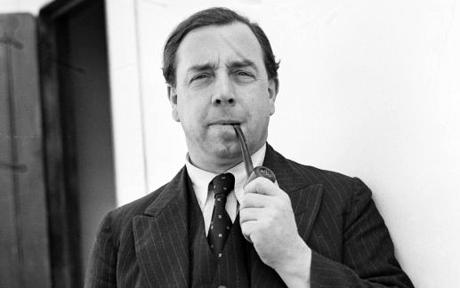On the page, it is a very conventional piece of theatre: it works like the 'well-made play'. It has one interior setting and takes place in real time: the writing is, in places, clunky and unconvincing - particularly in the character of Sheila - so there are challenges to overcome.
At a time when the play really did seem to have passed its sell-by date, in the late eighties/ early nineties, it was brought back to life in a stunning, award winning production by the National Theatre, which has run ever since. This is a mixed blessing, as now all productions of this play can seem over- informed by that ground- breaking production.
 |
| Vic Mills in rehearsal as Inspector Goole |
Our challenge is to bring this play to life in a way which is neither dependant on a conventional staging or on the more recently dominating ones.
We see the play as overtly political as well as social in its message: it makes a plea for society to mean something in world where it means a great deal less than it did when Priestley wrote the play.
We have the table at the centre, as a hub, around which the characters circle and circle like caged animals at times, like gladiators fighting for the entertainment of an audience at times, too. Our staging is representational not realist - the room is not a room but a stage, the drink are props and the doors and walls are not intended to look real. Some of them can be seen through. Colours and lighting change to reflect mood and ideas. The action pauses and characters move to new positions. We are giving the play a Brechtian treatment - in keeping with its ideas, if not with Priestley's approach to theatricality.
 |
| JB Priestley |
The language and manners of the characters is artificial in places, particularly that of Sheila, Gerald, Eric and Mrs Birling: Birling himself is more visceral and real. I am struggling to make the language and character of the Inspector real. I see him, not as a ghostly conscience of the people, but as a Marxist agitator, who has burst into this family as part of a plot to expose them- I doubt that is what Priestley had in mind, but it helps me make sense of what I am doing there.
In performance, I am trying to deliver a man with an appalled and outraged sense of justice, who is sickened and angered by these people with their privilege, selfishness and casual cruelty. He is suppressing this anger for most of his time on stage, just letting it burst out at points. I am trying to show his indifference to the manners and social expectations of the Birlings in every move and gesture.
 |
| Gareth Baskerville as Gerald with Vic Mills as Goole |
This is my third time playing the role and each time I see it differently to an extent. Just over two weeks to go to get this man right, and to bring this whole vision of ours to life. With so many youngsters seeing live, serious theatre for the first time- it feels like a hell of a responsibility.
Vic Mills

No comments:
Post a Comment